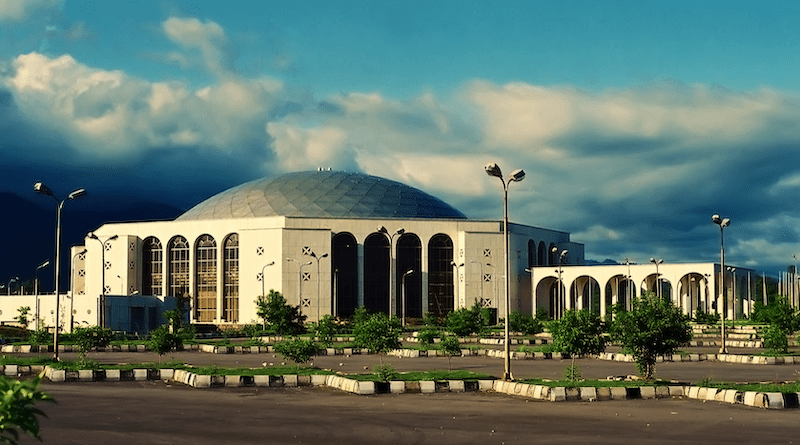Pakistan National Seminar On Agriculture And Food Security: Fostering Collaboration For A Sustainable Future – OpEd
By Dr. Sahibzada Muhammad Usman
The National Seminar on Agriculture & Food Security, held at the Jinnah Convention Centre in Islamabad, brought together key stakeholders to address the challenges faced by Pakistan’s agriculture sector and explore opportunities for collaboration and innovation. The seminar, attended by notable figures such as Prime Minister Muhammad Shehbaz Sharif and Chief of Army Staff General Syed Asim Munir, aimed to promote sustainable practices, enhance agricultural productivity, and ensure food security in the country.
Pakistan has been grappling with a growing gap between wheat requirements and production. The seminar provided a platform to discuss strategies to bridge this gap and improve wheat self-sufficiency. The reliance on imported raw cotton for the textile industry poses a significant financial burden on Pakistan. Participants explored ways to reduce this dependency and promote domestic cotton production. Climate change has had adverse effects on agricultural productivity in Pakistan. Discussions centered on mitigating the impact of climate change and implementing resilient farming practices to ensure sustainable food production. The seminar’s focus on enhancing productivity, exploring investment opportunities, and promoting collaboration in agriculture contributes to livelihood security. A robust agricultural sector supports rural communities, reduces income disparities, and helps alleviate poverty, thereby fostering social stability and reducing the risk of insecurity.
The seminar facilitated discussions on various collaborative initiatives and opportunities to drive progress in the agriculture sector: The Green Pakistan initiative, a significant focus of the seminar, aims to promote sustainable agriculture practices, afforestation, and environmental conservation. It provides a framework for collaboration among stakeholders to achieve a greener and more prosperous Pakistan. The seminar explored the potential of corporate farming and public-private partnerships in driving agricultural growth. These collaborations can bring technological advancements, expertise, and investments to the sector, fostering innovation and enhancing productivity.
Participants discussed the development of the livestock market, recognizing its potential as a source of income and employment. Strategies to improve livestock management, enhance breed quality, and boost market access were deliberated upon. The seminar shed light on investment opportunities in the agriculture sector. Participants discussed ways to attract domestic and foreign investments to modernize farming practices, improve infrastructure, and promote agribusiness ventures.
Mechanized and modern farming practices were emphasized during the seminar as means to enhance agricultural productivity: Discussions centered on the importance of farm mechanization, including the use of modern machinery and equipment, to increase efficiency and reduce labor-intensive farming practices. The seminar highlighted the significance of quality inputs, such as seeds, fertilizers, micro-nutrients, and pesticides, in optimizing crop yields. The adoption of appropriate inputs and best practices can contribute to improved agricultural productivity.
The seminar’s emphasis on corporate farming, public-private partnerships, and investment opportunities in agriculture encourages economic growth. Collaborative initiatives and investments in the agriculture sector can lead to increased productivity, job creation, and income generation, contributing to overall economic development. Discussions on the financial challenges faced by the textile industry, including the importation of raw cotton, can have a direct impact on the economy. Exploring strategies to reduce dependency on imported raw materials and promote domestic cotton production supports the textile industry’s growth and contributes to export earnings.
Prime Minister Muhammad Shehbaz Sharif delivered a keynote speech at the seminar, emphasizing the government’s commitment to agricultural development and food security. His address highlighted the importance of collaboration among stakeholders and the need for sustainable practices to overcome the challenges faced by the agriculture sector. Additionally, a modern agriculture and livestock exhibition provided a platform for participants to showcase innovative technologies, practices, and products related to agriculture and livestock.
The National Seminar on Agriculture & Food Security held at the Jinnah Convention Centre in Islamabad has had a multi-faceted impact on security, economy, and politics in Pakistan. By addressing climate change, enhancing agricultural practices, and promoting collaboration, the seminar contributes to building resilience, improving livelihoods, and ensuring food security. Additionally, the emphasis on economic growth, support to the textile industry, and investment opportunities in agriculture drives economic development. Furthermore, the government’s prioritization of agriculture and collaboration among stakeholders strengthens political stability and public support. The seminar serves as a significant step toward achieving a sustainable and prosperous future for Pakistan.

